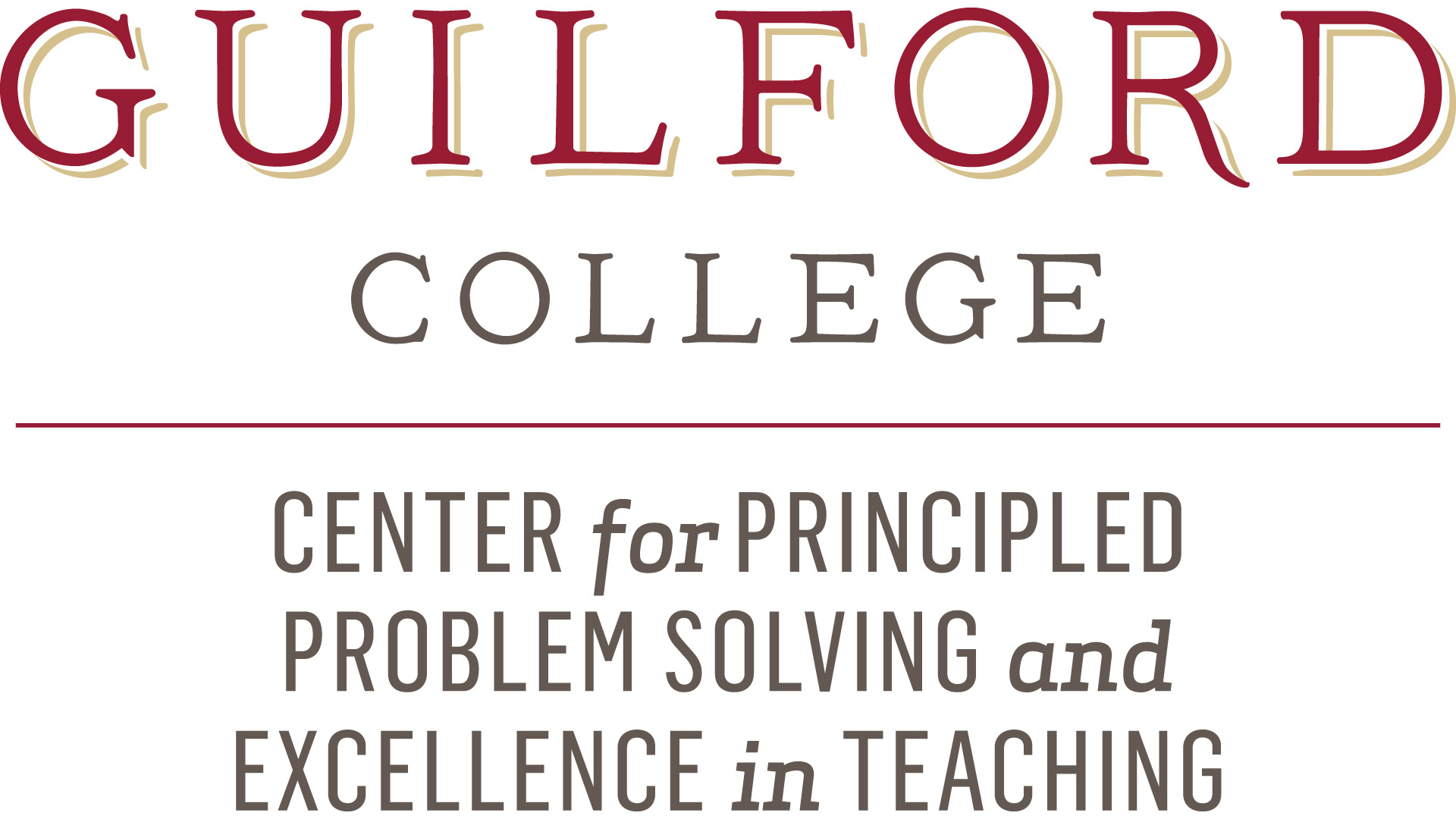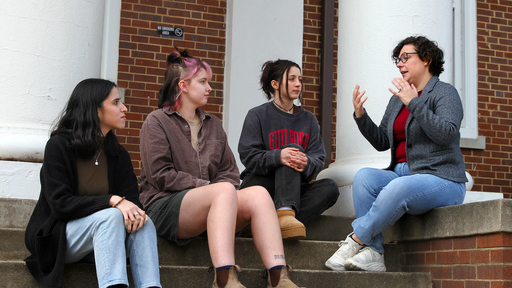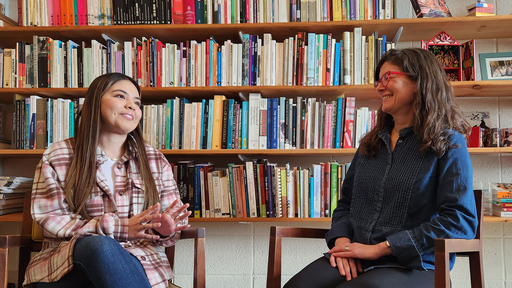
Values Focused Learning
This spring, a group of Guilford students will embark on a first-of-its-kind study abroad opportunity. Rachel Riskind, Christina B. Gydinski ‘54 Associate Professor of Psychology, and Karen Spira, Associate Professor of Modern Language Studies (Spanish), teamed up to create an experiential learning opportunity with a goal of including students who can’t always access a typical study abroad program.

The class was made possible in part through Guilford's Center for Principled Problem Solving and Excellence in Teaching (CPPSET). Rachel and Karen are fellows in this year’s cohort of eight. The fellows receive support and resources to pursue a project, which includes funding as well as time, as the program allows professors to opt out of teaching one course per academic year.
The course, Mexican Childhoods, includes a fully funded 10-day immersive experience in Oaxaca, Mexico. A collaborative effort across disciplines, it intervenes in the single narrative about Mexico that predominates in the U.S. media. Students will understand that even within one midsize Mexican city, children’s experiences are quite diverse, and that cultural and subcultural contexts are intertwined with caregiving practices. Students will also study how Mexican children learn about death and the importance of oral traditions, such as folk tales shared between generations, in Mexican homes.
“I've observed that study abroad programs tend to be prohibitively expensive for many students, and white students from affluent families are more likely than their peers to be able to participate. We wanted to create an equitable opportunity for more students to experience the benefits of study abroad," Karen says.
“The fellowship was so integral to making this course happen. Rachel and I used the time to meet twice a week, as if it were a class we were teaching. We used that time to discuss teaching strategies, arrange logistics, market our program to Guilford students, and collaborate with Advancement to make sure all the funding was in place.”
The First Focus: Problem-solving
Encouraging students to actively engage in addressing cultural, social and economic problems is a component of the Quaker testimonies that the College is founded upon. Guilford's motto instructs all Guilfordians to strive for “wisdom and virtue,” putting their learning into practice for a better world. That philosophy of education became more formal with the creation of the Center for Principled Problem Solving in 2008.
“The idea behind the creation of the center was to implement these strategies into campus life in a more concrete way,” says Mark Justad, director of CPPSET. “There are plenty of strategies for problem-solving, but what makes the PPS model unique is that it both starts and ends with the Guilford College Core Values, emphasizing collaboration.”
PPS strategies surface in a number of ways. The center sponsors such co-curricular opportunities as speakers, lunch-and-learns, classes, and internships to expose students to principled problem-solving. First-year faculty take part in a seminar to learn how to integrate PPS into their course work so that students experience these strategies in their classes.
In addition, students benefit in many ways from the projects of CPPSET fellows. This year alone, 18 students will travel with Karen and Rachel for their new course. Others have taken a first-year writing class with Cynthia Nearman, Associate Professor and Chair of the English and Creative Writing Department, piloting an experimental curriculum and writing assessment practices. Cynthia created her project to study anti-racist pedagogy and assessment in first-year writing. She plans to compile her experiences and share the findings with Guilford professors.
Additionally, Cynthia is partnering with two other Guilford colleagues on a presentation at a professional conference in Chicago in February. "Melissa Daniel, Director of the Learning Commons, Selena Wolf Berkley, Assistant Director of the Learning and Writing Center, and I are collaborating to develop and implement an anti-racist and broadly inclusive mission statement for all services offered by the College's Learning and Writing Center. At the conference in Chicago, we'll present as a panel about our progress on these interconnected, CPPSET-supported projects," Cynthia shares.
“There is so much research and study on our traditional educational practices and how we can transform them to better serve our students,” Cynthia says. “It’s been thrilling to me to have this opportunity to really explore how to set up teaching and learning in the writing classroom and sustain a conversation with my students about the varieties of English and how and what you write according to your audience.”
Then there are the opportunities for students to pursue their own projects. The center offers Changemaker grants for students that provide up to $1,500 to fund a project featuring the College’s Core Values.
“This grant allows students the opportunity to transform their passion into action. It gives them experience articulating the particular values they’re pursuing and the issue they’re engaging. It also teaches the skills of grant writing and budgeting,” Mark says. “We’ve seen a lot of great projects come from this, from an analysis of the College’s endowment practices in regards to the fossil-fuel industry to a reusable cup program for the campus coffee shop.”
Overall, whether funneled through faculty projects, pedagogical innovation, or student projects, these investments support Guilford’s rigorous, hands-on experiential learning goals that make it such a transformative education.

A Second Focus: Teaching
In 2019, 10 years after the Center's founding, it saw a big change and expansion of its purpose.
“Guilford has long been a teaching college, and when we created the center in 2008 it was with the goal to grow out of and enhance academics, consistent with our history as a Quaker institution,” Mark says. “Therefore it seemed only natural to expand the center to include Excellence in Teaching to the scope of work.”
The Excellence in Teaching component provides resources and support for faculty to create meaningful learning environments for all students.
“It’s our desire to do right by as many students as we can,” Cynthia says. “It’s invaluable to me to have the programming and support from CPPSET — to learn from the newest strategies, experience the technology that can help us in the classroom, and just talk with other faculty who are experiencing similar things. I’ve really seen the impact in the classroom of the things I’ve learned from CPPSET’s programming.”
In all aspects of CPPSET’s work, from encouraging students to participate in principled problem-solving strategies to providing pedagogical resources for teachers, Guilford's Core Values drive all of the center’s work.
“In the end, the goal of the center is consistent with Guilford’s history," Mark says, "for students to leave us with the capacity to engage the world in meaningful ways."

